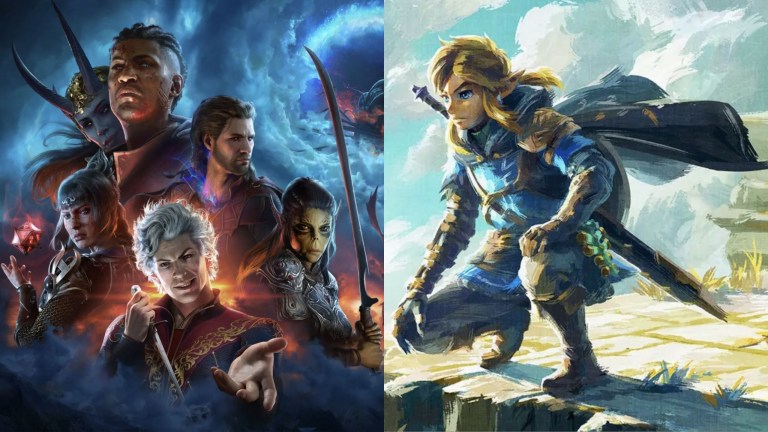Baldur’s Gate 3 vs. Tears of The Kingdom Is An Impossible Game of the Year Debate
Baldur's Gate 3 and The Legend of Zelda: Tears of the Kingdom are locked into a Game of the Year debate that is doing more harm than good.

2023 has produced quite a few excellent games, but few have wowed quite like The Legend of Zelda: Tears of the Kingdom. The game was immediately hailed as a masterpiece and was shaping up to be a shoo-in for “Game of the Year.” But then came Baldur’s Gate 3. Not only is this game an amazing experience, but it blew past even its developer’s wildest expectations and started setting records that it continues to beat.
Suddenly, Tears of the Kingdom had serious competition, and now gamers everywhere are arguing over which title deserves to be crowned. Even though we (and many others) will also eventually weigh in on that debate, I frankly think this discussion is starting to showcase the worst aspects of the Game of the Year concept and not the celebration that title is intended to be.
It goes without saying that every year brings us many excellent games. However, recent years have seen many reach a general consensus regarding which game deserves the title of “GOTY.” For instance, in 2022, Elden Ring pretty much swept the awards season despite incredible competition. Nobody will deny that God of War: Ragnarok and Xenoblade Chronicles 3 are must-play titles for their respective platforms, but they don’t compare to the grueling and engrossing open-world adventure of Elden Ring. At the moment, though, the race between Baldur’s Gate 3 and Tears of the Kingdom is too close to call. Yes, the games are just that good, but this particular competition includes an unexpected wrinkle caused by our innate need to crown a champion gear every year.
You don’t have to play Baldur’s Gate 3 or Tears of the Kingdom for long to discover why these games are equally qualified for the title of 2023 GOTY. Both offer massive adventures, although their specialties lie in different mechanics and aspects.
Baldur’s Gate 3 is a pure role-playing experience that focuses on narrative and character depth. Larian Studios filled their game world with tons of choices (and dice rolls) that can change how side quests and the main narrative play out. It’s literally impossible to see every well-written outcome the developers created in one playthrough. Moreover, players are experimenting with spells and abilities and discover new, overpowered combos every day. As of writing, the latest broken tactic consists of an oversized owlbear performing a flying body press.
Interestingly, Tears of the Kingdom’s brilliance also lies in letting players traverse a huge world however they see fit. However, it takes a slightly different approach to that concept. Half that game’s fun comes from taking a break from the constructed main story to wander off the beaten path and see what you find. Moreover, Tears of the Kingdom is essentially an elaborate physics simulator that lets players manipulate unsecured objects to create medieval Rube Goldberg machines used to solve dungeon puzzles, make combat easier, or just cruise around Hyrule in style.
The two games distinguish themselves from each other and the rest of the 2023 pack in numerous other ways that further complicate this debate. For instance, Baldur’s Gate 3 is drowning in a BAFTA-worthy story that is so big and branching you have to play through it multiple times, so it’s clearly the better game. Yet, the world of Tears of the Kingdom is such a blast to explore that you rarely even need a story. The game has a narrative, but it is overshadowed by Tears of the Kingdom’s ability to offer worthwhile adventures even when you are just climbing mountains or exploring dark caverns. That feature alone should solidify Tears of the Kingdom’s GOTY position. It’s easy to go back and forth like this ad nauseam, which is what so many gamers and outlets are doing right now.
This situation reminds me of 2020: the year many outlets declared The Last of Us Part 2 GOTY. Personally, I would have gone with Ghost of Tsushima, but that’s not why this debate feels so familiar. On March 20, 2020, two games that would go on to receive numerous GOTY nominations were released: Doom Eternal and Animal Crossing: New Horizons. However, instead of gamers fighting amongst each other to decide which of those games should claim dominance, fans joined hands in harmony over the titles and created some adorable metal crossover animations and songs in the process.
Before their launch, one could have easily assumed the respective fanbases would have clashed, but their mutual respect and cooperation caught many off guard. Turns out these fanbases were the cause of this unexpected union, despite the fact there was seemingly little overlap in each game’s demographic. It was almost like a “Barbenheimer” moment for gaming. One game was a tough-as-nails FPS that appeals to fans of fast action and shotguns, while the other is a slow social simulator for those who love a calming experience and want to live the dream of being able to pay off debts and house mortgages. Yet, people found room to celebrate both.
But that’s sadly not what we’re seeing this year. A major problem with the ongoing Baldur’s Gate 3 vs. Tears of the Kingdom debate is that, while the games aren’t part of the same genre and have different specialties, their differences, and individual acclaims, are actually pitting people against each other. These games could (and maybe should) be beacons of hope that represent not just excellent and different forms of game design but ways to do things that challenge existing and often frustrating industry standards. However, each game is unintentionally cannibalizing the other, not because they were meant to but because that’s what gamers do. We love to label one game as the de facto “Game of the Year” each year. That phrase has become as much of a weapon as a celebration. Even now, arguments are erupting over each title’s record-high Metacritic scores and whether one game “deserves” more algorithm-determined review points than the other.
Quite frankly, it’s been so long since we’ve seen two games so evenly matched and deserving of being named Game of the Year that we might have forgotten how to cope with the situation and simply appreciate what we’re seeing. Baldur’s Gate 3 and The Legend of Zelda: Tears of the Kingdom are clearly shining examples of their respective genres, yet they are united by their quality, ambition, and their creators’ desire to stand out from the pack. No matter which game is actually declared the Game of the Year by all who choose to assign that title, it’s bound to be a close call. No matter which title racks up more review points, more sales, or more end-of-year honors, though, it’s important to take a moment, take a breath, stand back, and appreciate how games like these challenge so many industry standards and modern expectations, including Game of the Year.
